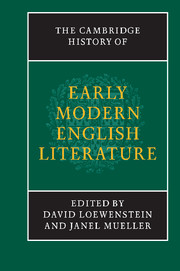Book contents
- Frontmatter
- Introduction
- 1 Modes and means of literary production, circulation and reception
- 2 The Tudor era from the Reformation to Elizabeth I
- 7 Literature and national identity
- 8 Literature and the court
- 9 Literature and the church
- 3 The era of Elizabeth and James VI
- 4 The earlier Stuart era
- 5 The Civil War and Commonwealth era
- Chronological outline of historical events and texts in Britain, 1528–1674, with list of selected manuscripts
- Select bibliography (primary and secondary sources)
- Index
- References
9 - Literature and the church
from 2 - The Tudor era from the Reformation to Elizabeth I
Published online by Cambridge University Press: 28 March 2008
- Frontmatter
- Introduction
- 1 Modes and means of literary production, circulation and reception
- 2 The Tudor era from the Reformation to Elizabeth I
- 7 Literature and national identity
- 8 Literature and the court
- 9 Literature and the church
- 3 The era of Elizabeth and James VI
- 4 The earlier Stuart era
- 5 The Civil War and Commonwealth era
- Chronological outline of historical events and texts in Britain, 1528–1674, with list of selected manuscripts
- Select bibliography (primary and secondary sources)
- Index
- References
Summary
This chapter addresses the advent of the English Reformation from its political inception in the ‘Great Matter’ of Henry VIII’s divorce suit to its formal reinstatement in the first year of Elizabeth’s reign. Here the phrase ‘English Reformation’ will have a dual reference, both institutional and textual – denoting, on the one hand, the emergent entity of an autonomous national church comprehending England, Wales and parts of Ireland, and, on the other, the literature in English that articulated, probed, contested and projected the religious claims and aspirations of this thirty-year period.
Prior to these tumultuous decades of the sixteenth century, the domain of religious adherence, faith and practices had been a Christendom imagined as universal through its obedience to the Pope, but in fact experienced much more locally, in the human associations and the sacred traditions of one’s own parish church. It has long been commonplace to observe that the national Church of England began as a top-down imposition by successive Tudor sovereigns, eventually acquiring an identity that a popular majority came to embrace as its own. While accurate enough regarding the beginning and end of a sometimes ruptural, sometimes gradual, always complex process, this commonplace sheds no light on intermediate phases. Across a spectrum of recent historical scholarship, however, the English Reformation has taken interpretive shape as a series of confrontations and negotiations that effected transformations in English culture in the 1530s, 1540s and 1550s as successive political agendas appropriated and forefronted certain religious issues.
- Type
- Chapter
- Information
- The Cambridge History of Early Modern English Literature , pp. 257 - 310Publisher: Cambridge University PressPrint publication year: 2003



